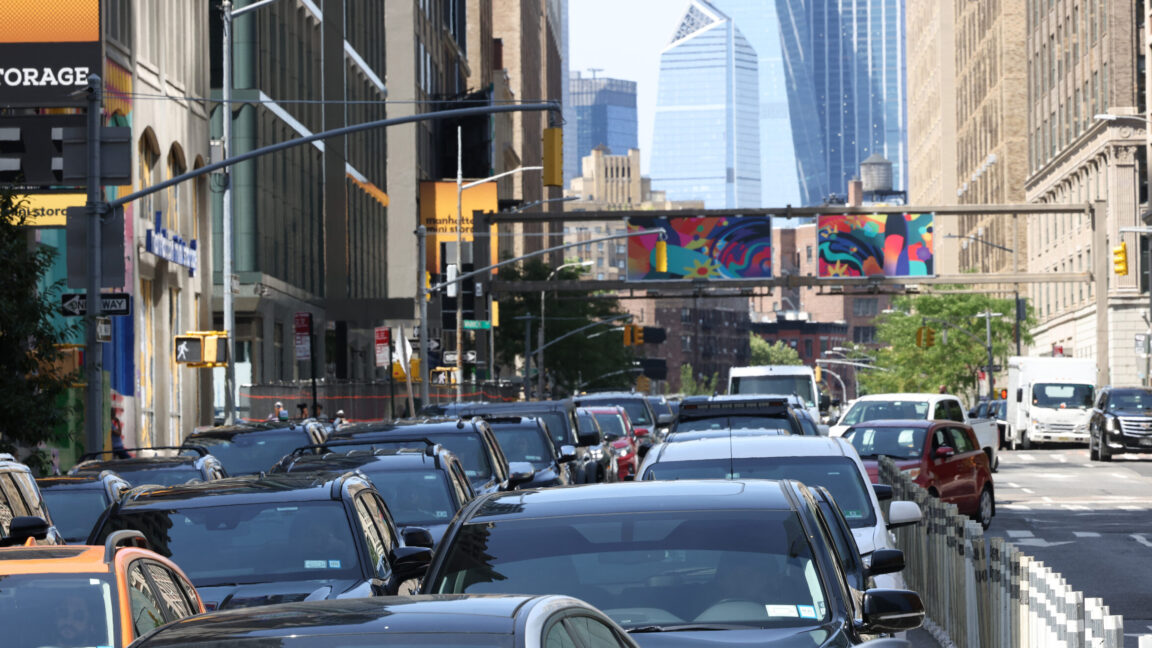
Trump rescinds DOT approval for NYC congestion toll, condemns city to pollution
arstechnica.com
what's next, the return of leaded gasoline? Trump rescinds DOT approval for NYC congestion toll, condemns city to pollution NYC voters overwhelmingly wanted less traffic and air pollution; Trump says tough. Jonathan M. Gitlin Feb 20, 2025 10:25 am | 48 If you only ever traveled by helicopter or motorcade, you'd probably be completely out of touch when it came to traffic, too. Credit: Michael M. Santiago/Getty Images If you only ever traveled by helicopter or motorcade, you'd probably be completely out of touch when it came to traffic, too. Credit: Michael M. Santiago/Getty Images Story textSizeSmallStandardLargeWidth *StandardWideLinksStandardOrange* Subscribers only Learn moreNew Yorkers' ongoing attempts to rein in car traffic on the island of Manhattan took a serious blow yesterday. Transportation Secretary Sean Duffy terminated the city's congestion charge, which made drivers pay for going below 60th Street.Duffy claimed that it's unfair that drivers should have to pay to use roads since there are already tolls on bridges into Manhattan and claimed there are no alternatives, ignoring the buses and subway trains operated by the Metropolitan Transit Authority.Further, the city is being unfair against people who live far away, Duffy said. "The toll program leaves drivers without any free highway alternative and instead takes more money from working people to pay for a transit system and not highways. Its backwards and unfair," he said in a statement.Worse yet, Duffy claimed the congestion charge, which was implemented to improve air quality for more than a million Manhattan residents and workers, is somehow discriminatory against the poor. "Every American should be able to access New York City regardless of their economic means. It shouldnt be reserved for an elite few," Duffy wrote. As a result, he has rescinded the required Department of Transportation approval necessary to impose a road toll.Congestion pricing has often proved unpopular before implementation, even in cities less poisoned by car-brained policymakers, such as Stockholm and Singapore. Business owners fear a loss of customers from the removal of cars and parking, despite plenty of evidence that disproves this shibboleth. And once in place, city residents quickly start to love the reduction in car traffic, noise, and pollution, not to mention the added income for city programs like more public transport.New York's attempts to improve the quality of life of its residents by reducing car traffic below 60th Street have been long and tortuous. There have always been tolls to drive across the bridges or through the tunnels into Manhattanone can thank Robert Moses for that. New tolls or bans on cars coming into Manhattan had been proposed over the years, but it wasn't until 2019 that the state legislature made it official.A difficult birthThe plan was met with plenty of opposition despite the promise of generating around $15 billion a year in revenue, and a 2021 implementation date slipped to 2024. But at the last minute, New York Governor Kathy Hochul, deferring to the wishes of commuters from out of state rather than the ones that elected her, paused the congestion charge three weeks before it was meant to go into effect on June 30 that year.Following public outcry at the loss of MTA revenue and the promise of worse air quality and more road deaths, advocates and legislators fought back, and following a series of lawsuits, NYC's congestion charge went into effect on January 5, 2025, with a peak time toll of $9 and an off-peak price starting at $2.25.And it's working. "Travel times through the citys most congested corridors are down for millions of commuting New Yorkers, while pedestrian traffic is up and data shows air is cleaner and streets are safer for cyclists, pedestrians, and drivers alike," said David Kelly, senior director at the Environmental Defense Fund. "Funding from the program is already working to improve public transportation, allowing the MTA to purchase 265 new clean, cost-efficient electric buses and start new projects to speed up trains and buses throughout the region."The following day saw the inauguration of Donald Trump as the country's 47th president. While campaigning, Trump had promised to undo the congestion charge, and he has now done it."When was the last time Donald Trump took the subway or the bus in New York? If he spent just one day living like the majority of New Yorkers, he'd realize the terrible congestion that contributes to polluted air and too many vehicles on the road wasting people's time stuck in traffic," said Sierra Club Executive Director Ben Jealous. "The Sierra Club fought Governor Hochul's unnecessary delay of congestion pricing last year, and well fight this unlawful attack as well."Jonathan M. GitlinAutomotive EditorJonathan M. GitlinAutomotive Editor Jonathan is the Automotive Editor at Ars Technica. He has a BSc and PhD in Pharmacology. In 2014 he decided to indulge his lifelong passion for the car by leaving the National Human Genome Research Institute and launching Ars Technica's automotive coverage. He lives in Washington, DC. 48 Comments
0 Kommentare
·0 Anteile
·64 Ansichten


